Mrs. Dianna Melrose UK Am bassadr ess to Cuba
Refined and humble like the green grass that grows in the garden of her majestic residence in Vedado, Mrs. Dianna Melrose makes this assertion with the same sincerity that has marked her lifetime: “I’m not a career diplomat.”
Born in Zimbabwe from a Chilean mother and a father of deep Latin American roots, Dianna obtained a Degree in Spanish and French languages in London and soon after that she started to work as a Spanish translator for a business company. “Nearly all of my life —since 1980— was devoted to OXFAM in Great Britain, an NGO with a mission to promote social justice and international development,” she says.
“My job there had to do with lobbying, talking the governments of developed nations into embracing fairer international trade relationships. I took part in campaigns against Apartheid. By that time I wrote a book entitled “Bitter Pills” that blasted the pharmaceutical industry for selling medications at very unaffordable prices.” Even though she doesn’t admit it, her effort played a role in steering OXFAM’s international policy. Perhaps that explains why when the Labor Party took the reins of the government back in 1999, Mrs. Melrose landed a new job in the British Foreign Office.
“They wanted me there to challenge our foreign policy, to assess it and question it, and come up with new proposals. My intention was to stay there for a while and then get back to my normal life at OXFAM. But that work was so interesting and they wanted more women in high-ranking diplomatic posts, that after passing a very tough contest I decided to stay.”
In 2000, Dianna was promoted to Chief of the Policy Planning Staff, a high responsibility as many other important missions she was assigned at the British Foreign Office and later on in the Ministry of International Development. In August 2004, she arrived in Cuba for the first time. She came as a tourist with her two children and other family members in tow. They visited Trinidad, Viñales, Havana. They listened to a lot of Cuban music —that they grew to love— and admired the architecture, the beaches and the 1950s-vintage cars. All of a sudden, though, they were taken aback by powerful hurricane Charley.
“We were in the Sevilla Hotel and we were so impressed by all the things people there did to protect the Cuban people that when I came back home I headed straight for the Ministry of International Development’s HQs and I started to tell my story. I told them that they had done this and that, that they’d cut off trees and evacuated people. And then they told me, ‘Well, everybody knows that Cuba is the best country in the Americas when it comes to hurricane disaster management and prevention’.”
Dianna resumed her diplomatic career in 2006.
Now she recalls, “I looked at the list of available countries for new ambassadors and I saw Cuba. So, I said to myself, ‘this is a job just for me’. I made my request and out of a stroke of luck —the competition was really huge because many people wanted to come down here— I’m now the ambassadress to Cuba and I’m as happy as I can be. I’m a woman of challenges and I’d never ever been an ambassadress before, so I became the first British woman to come to Cuba with this mission.”
Even though she handed in her letters of credence in September this year, Dianna Melrose says relations between the two nations “are very good and my job is to further strengthen them.” She speaks of the close ties in the battle against drug trafficking and for childhood protection, in the preparedness against hurricanes in the Caribbean, and in the fields of scientific and professional exchange, as well as culture. She also talks about the challenge of keeping the UK, with over 210,000 visitors a year, as the island nation’s second-best outbound market.
With a lovely smile that’s always on her face, the ambassadress reveals the “instruction” she got from her bosses before flying to Havana: “Be your own woman, Dianne,” they told her.























































































































